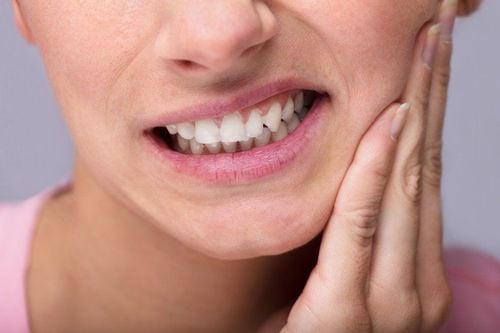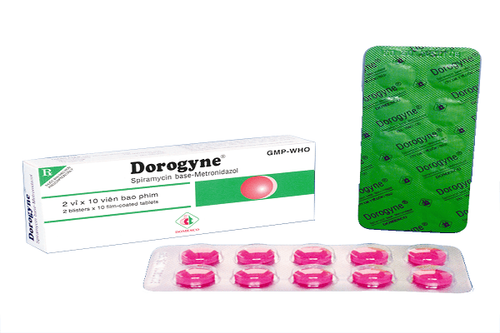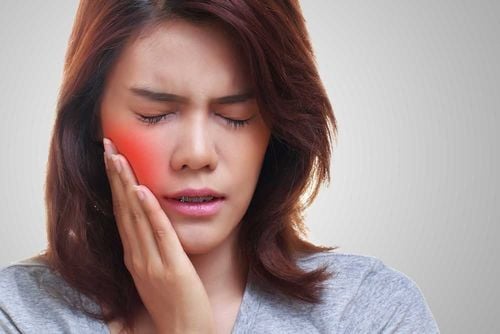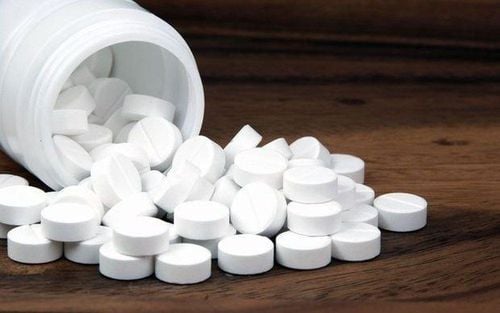This is an automatically translated article.
Sensitive, sensitive teeth can make eating and drinking difficult and painful. This situation needs to be rectified as soon as possible to avoid causing further damage to the teeth. You can refer to the effective home remedies to reduce sensitivity below.
1. Common causes of sensitive teeth
Teeth can become sensitive when enamel, the top protective layer of teeth, wears away. As enamel wears away, the layer of dentin underneath can become more permeable, allowing liquids and gases to pass through it more easily.
Beneath the dentin is the pulp containing many nerve endings and blood vessels. As the fluids pass through the dentin to reach these nerve endings, a person may experience pain. Drinking hot or cold liquids and chewing food can cause this pain.
The following can all wear down tooth enamel and lead to tooth sensitivity:
Gingivitis caused by plaque buildup. Tooth decay Improper at-home teeth whitening Brushing too much or brushing too hard Eating acidic foods Grinding teeth.
2. Effective ways to reduce tooth sensitivity at home
Sensitive teeth is a fairly common and treatable condition. Some home remedies that can help with tooth sensitivity include:
2.1. Gargling with oil is an effective way to reduce tooth sensitivity. Gargling with sesame oil or coconut oil can help reduce tooth sensitivity effectively. Oil pulling is a traditional Ayurvedic practice that originated in India, which involves gargling oil around the mouth for a few minutes before spitting it out.
Results of a 2009 study show that gargling with sesame oil can reduce symptoms of gum disease, which dentists call gingivitis. In addition, a daily coconut oil rinse can reduce plaque formation and signs of gingivitis.
2.2. Guava leaves help relieve tooth sensitivity at home Chewing guava leaves or using a topical gel containing guava leaf extract can help relieve pain and tooth sensitivity.
A 2017 review of the health benefits of guava leaves, the flavonoid-rich extract in guava has pain-relieving, anti-inflammatory, and antibacterial properties that could potentially soothe toothaches.

Giảm ê buốt răng hiệu quả với lá ổi
2.4. Garlic to reduce tooth sensitivity at home Garlic contains allicin, which has antibacterial properties and can help kill bacteria like Streptococcus mutans that can lead to dental diseases.
The accumulation of S. mutans around teeth and gums can lead to tooth decay, worsening tooth sensitivity. Fighting these bacteria can slow inflammation and reduce tooth sensitivity.
2.5. Gargle with salt water Gargling with salt water can reduce dental plaque. To make a salt water gargle, add half a teaspoon of salt to 240ml of warm water. Then rinse your mouth with this solution several times before spitting it out.
2.6. Capsaicin gel reduces tooth sensitivity Capsaicin is a spicy substance that occurs naturally in chili peppers. Although capsaicin can cause burning when applied to the skin or gums, it can also reduce pain. Applying capsaicin gel to the gums can ease the pain caused by sensitive teeth.
Scientists aren't sure exactly how this works, but they believe capsaicin can paralyze nerve fibers, making them less able to transmit pain signals. Therefore, before using this remedy you should consult your dentist.
2.7. Turmeric for tooth sensitivity at home Turmeric is a spice in cooking and it's also an Ayurvedic remedy for reducing inflammation. Turmeric contains curcumin, which may help relieve pain.
A 2014 study found that turmeric extract was as effective as ibuprofen in reducing pain from osteoarthritis of the knee.
You can try making a paste by mixing turmeric and water, then rubbing it into your gums to help relieve pain and tooth sensitivity. However, there are currently no scientific studies to support this use of turmeric.
An alternative is to make a topical mixture of 1 teaspoon of turmeric powder, 1⁄2 teaspoons of salt, and 1⁄2 teaspoons of mustard oil. Then you apply this mixture to your teeth and gums twice a day to relieve pain.
2.8. Fluoride helps reduce tooth sensitivity Using dental products that contain fluoride can reduce the risk of tooth decay and may also help reduce tooth sensitivity.
Many fluoride products are available that are suitable for daily use, including:
Toothpaste Gel Mouthwash

Kem đánh răng chứa Florua giúp giảm ê buốt răng tại nhà
2.9. Desensitizing toothpaste helps reduce tooth sensitivity effectively Desensitizing toothpaste is a toothpaste that contains agents that make dentin less permeable. Dentin is a hard, spongy tissue that lies underneath the enamel of all teeth.
When the dentin is less permeable, it means it is harder for liquid to pass through it. Reduced permeability protects the underlying nerve, helping to reduce tooth sensitivity and pain.
In desensitizing toothpastes, there are compounds that protect nerve endings from irritants. The most active ingredient is potassium nitrate, a compound that blocks pain signals from traveling from nerves in your teeth to your brain. After a few uses of this cream, the sensitivity of your teeth will decrease.
2.10. Hydrogen peroxide is a mild antiseptic that is often used to help disinfect cuts, burns, and other wounds to prevent infection. You can also use peroxide as a mouthwash to heal gums and prevent infection.
To use hydrogen peroxide as a mouthwash, you need to do the following:
Add two caps of 3% hydrogen peroxide to warm water in equal parts. Keep the mixed solution in your mouth for up to 30 seconds. Spit out the rinsed solution. Then rinse your mouth with white water to remove any remaining hydrogen peroxide. 2.11. Honey and warm water for tooth sensitivity at home Honey is an antibacterial agent and can be used for wound management. Honey can help speed up the healing process and reduce pain, swelling, and inflammation.
To relieve pain caused by sensitive teeth, gargle with warm water and a teaspoon of honey. This mouthwash will promote the healing of mouth wounds.
2.12. Green tea helps to reduce tooth sensitivity at home Green tea is a product known for its many health benefits. Green tea has been studied for cancer prevention and heart health thanks to its antioxidant effects and anti-inflammatory properties.
Green tea can also help with oral health. To treat sensitive teeth, you can use unsweetened green tea as a mouthwash twice a day to strengthen teeth and reduce inflammation.
2.13. Vanilla Extract Vanilla extract has antiseptic and analgesic properties. In fact, it has been used to treat pain and discomfort in babies when they start teething.
To treat sensitive teeth, pour vanilla extract onto a cotton ball. Apply that cotton ball to the gums for a few minutes and repeat the process as often as needed.
3. Sensitive teeth when to see the dentist?
If you experience persistent or severe tooth pain and sensitivity, you should see your dentist. Depending on the cause and severity of the sensitivity, your doctor may recommend treatments such as:
Use of fluoride gel or desensitizing agents Fillings Dental crowns A coating on the teeth Surgery gingival grafting Take root canal

Bạn có thể tới gặp bác sĩ để được đưa ra giải pháp giảm ê buốt răng hiệu quả
4. Tips to prevent tooth sensitivity effectively
You can protect the enamel on your teeth and prevent tooth sensitivity by:
Brushing your teeth properly twice a day with a fluoride toothpaste. Floss properly to clean teeth once a day. Rest after teeth whitening Limit eating sugary, starchy and acidic foods. Limit alcohol intake Wear a mouth guard at night to prevent teeth grinding. See your dentist regularly to check your oral health. Quitting smoking. Many people experience tooth sensitivity and pain, possibly due to the gradual erosion of tooth enamel. Research shows that there are a number of home remedies that can help treat tooth sensitivity. Besides, good oral hygiene is the best way to prevent tooth decay, gum disease and the development of sensitivity.
People with severe or persistent sensitivity should see a dentist to check their oral health. Depending on the cause, your dentist may be able to recommend in-office therapies to effectively relieve tooth sensitivity.
Please dial HOTLINE for more information or register for an appointment HERE. Download MyVinmec app to make appointments faster and to manage your bookings easily.
Reference sources: medicalnewstoday.com, healthline.com












